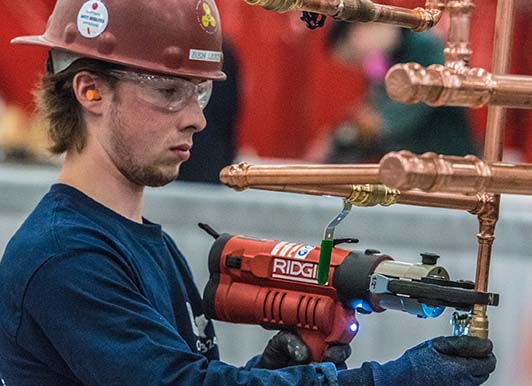Electrical Installations
What is electrical installations?
Electrical wiring is done by electricians who install, repair and maintain wiring, switches, conduits, circuit breakers, lighting and other apparatus in buildings and other structures. They need electronics knowledge and trouble-shooting skills to provide maintenance services for electronically controlled systems. Proficiency in all types of electronic applications is important as electricity is used for a variety of purposes, including climate control, security and communications.
An electrician reads and interprets blueprints, plans and sketches, following the variety of methods and practices used in the construction field to complete basic wiring circuits in accordance with the Canadian Electrical Code. Electricians need to understand electronics in order to install and maintain the increasing amount of electronic equipment involved in modern construction projects. Keeping up with trends and new technology and continuing to upgrade technical skills is an important part of the job.
Electricians perform some or all of the following duties:
- Read and interpret drawings, blueprints, schematics and electrical code specifications to determine layout of industrial electrical equipment installations
- Install, examine, replace or repair electrical wiring, receptacles, switch boxes, conduits, feeders, fibre-optic and coaxial cable assemblies, lighting fixtures and other electrical components
- Test electrical and electronic equipment and components for continuity, current, voltage and resistance
- Maintain, repair, install and test switchgear, transformers, switchboard meters, regulators and reactors
- Maintain, repair, test and install electrical motors, generators, alternators, industrial storage batteries and hydraulic and pneumatic electrical control systems
- Troubleshoot, maintain and repair industrial, electrical and electronic control systems and other related devices
- Conduct preventive maintenance programs and keep maintenance records
- May install, maintain and calibrate industrial instrumentation and related devices.
HOW TO JOIN THE FIELD
Completion of secondary school is usually required.
Completion of a four- or five-year industrial electrician apprenticeship program or A combination of over five years of work experience in the trade and some high school, college or industry courses in industrial electrical equipment is usually required to be eligible for trade certification.
Trade certification for industrial electricians is compulsory in Prince Edward Island, Quebec and Manitoba and available, but voluntary, in Newfoundland and Labrador, Nova Scotia, New Brunswick, Ontario, British Columbia and the Yukon.
Additional construction electrician certification may be required for industrial electricians when the employers are not owners of the industrial electrical equipment.
Red Seal endorsement is also available to qualified industrial electricians upon successful completion of the interprovincial Red Seal examination.
INDIGENOUS AND REMOTE CONSIDERATIONS
Indigenous and remote communities may not have many people who work in this trade, so there likely wouldn’t be too much choice on jobs in this field. In small, fly-in communities, there may be only one or two companies to work for while staying in their home community. This may mean someone pursuing this trade will be looking at relocation or travelling to nearby communities. Larger centers may have options for apprenticeship in this trade however it will be important to know the local economy to know what options are available.
With math literacy in the north being lower than in other places, northern and remote students may need extra support in order to pass tests and get their red seal.
DISABILITY CONSIDERATIONS
With this job being heavy manual labour, it may not be possible for someone with a severe physical disability. Accommodations may be necessary for someone with a learning disability.
Find the right career path for you with our interactive map!
Trouvez le cheminement de carrière qui vous convient grâce à notre carte interactive!
Sample Job Titles
SAMPLE TITLES
- Refrigeration Mechanic
- Electrical Engineer
- Industrial Electrician
- Marine electrician
- Mill electrician
- Plant electrician
Companies and Sectors
WHO DO THEY WORK FOR?
- Residential industry
- Commercial industry
- Manufacturing
- Construction firms
- Self-employed

Electrical Installations and the Skills for Success Program
The key Skills for Success for this career path are:
- Reading
- Numeracy
- Problem Solving



